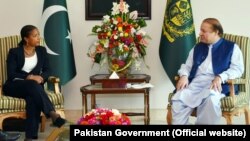U.S. National Security Adviser Susan Rice told Pakistan’s civil and military leadership Sunday that terrorist and militant attacks in Afghanistan have become “a key point of regional friction,” according to a senior U.S. official who briefed the media in Islamabad.
“Addressing this challenge,” Rice told Pakistan, “will be imperative for Pakistan's relations with its neighbors and with Washington, especially given the recent upsurge in violence in Kabul and the Taliban's bloody campaign this fighting season in Afghanistan.”
Calling the attacks “absolutely unacceptable,” the official added that the U.S. believes they were “perpetrated by the Haqqani Network” one of the deadliest militant groups of the Afghan Taliban. The network’s senior leadership is believed to be hiding in Pakistan. Afghanistan has often accused Pakistan of providing safe havens to militants who carry out attacks inside Afghanistan.
Rice also discussed with the Pakistani leadership “specific measures” that Pakistan can take to help reduce violence in Afghanistan.
A senior Pakistani security official told VOA “the discussions were frank and candid.”
“We told them that peace and stability in Afghanistan was the responsibility of all sides and stakeholders,” the Pakistani official said. “They talked about the Haqqani network and we shared our concerns.”
Collective efforts needed
The head of Islamabad’s state-run Institute of Strategic Studies, Masood Khan, said securing the 2,500-kilometer mostly porous border with Afghanistan and countering terrorism require collective efforts.
“We know that there are terrorists on this side of the border, and there are terrorists on that side, and this is a common enemy and we are trying to wrestle it down," he said. "We are trying to neutralize this enemy, this monster, and it has to be a collective effort of the United States, Afghanistan and Pakistan.”
In their discussions with Rice, Pakistani officials insisted that Kabul was responsible for the lack of progress in peace and reconciliation with the Taliban, according to the Pakistani official.
He also said Rice “appreciated Pakistan’s military operation in North Waziristan and acknowledged its impact.”
Uptick in terrorist attacks
A senior U.S. official said Rice told her Pakistani hosts that Washington shares Afghan “concerns” and “anguish” about the uptick in terrorist attacks that the al-Qaida-linked Haqqani network has recently staged in Kabul.
The violence has killed or wounded hundreds of people, mostly civilians.
The official told reporters in Islamabad at the end of Rice's meetings that she called the Haqqani-perpetrated violence “absolutely unacceptable” and said Washington also is “very concerned” about possible future attacks in Afghanistan.
Pakistan has insisted that its military operation in North Waziristan has targeted all militants without discrimination.
Opportunities to 'degrade the Taliban'
Rice also told Pakistan to “take advantage of the death of Mullah Omar and the Taliban leadership transition,” which provides opportunities to “degrade the Taliban” and “reduce violence,” according to the senior U.S. official.
Pakistan hosted the first official round of talks between the Afghan government and the Taliban in early July. A later round was cancelled when news broke that Taliban leader Mullah Omar had been dead for two years. Since then, Taliban attacks in Afghanistan have intensified.
Susan Rice was in Pakistan at the invitation of the Pakistani government, as part of her trip to Asia. Contrary to reports in the local media, this trip was planned weeks ago and was not an “emergency visit” in response to rising tensions with its eastern neighbor India, State Department officials in Washington clarified.
However, the India-Pakistan tensions did come under discussion. Rice was interested, the senior U.S. official said, in “hearing from Pakistan authorities their thoughts on how to reduce tensions with India.”
During her brief visit, Rice met Pakistan’s Prime Minister Nawaz Sharif, Adviser to the Prime Minister on National Security and Foreign Affairs Sartaj Aziz, Chief of Army Staff General Raheel Sharif, and other senior officials.
Ambassador Rice also invited Prime Minister Sharif to visit the White House on October 22, to meet with President Barack Obama.





